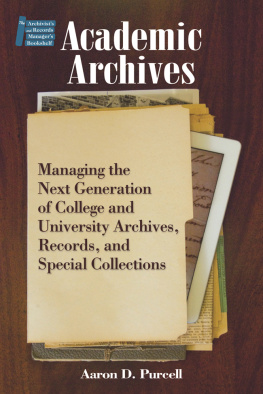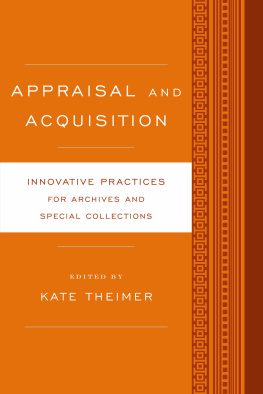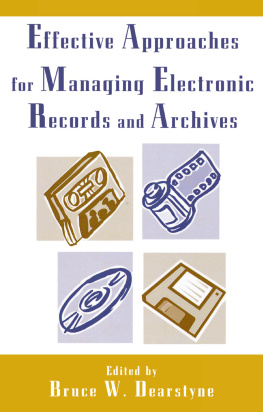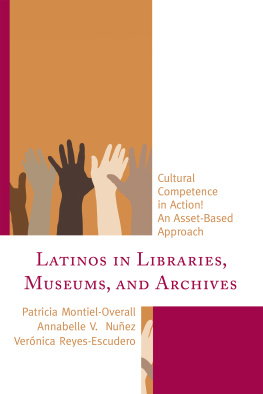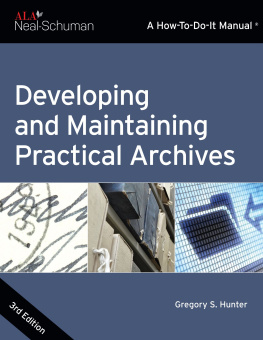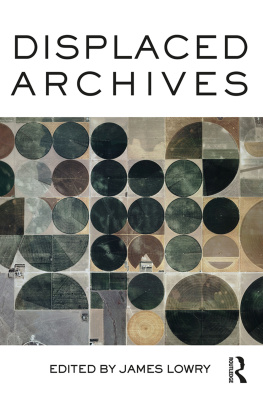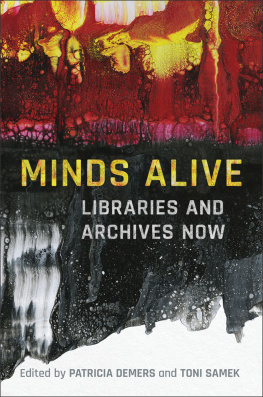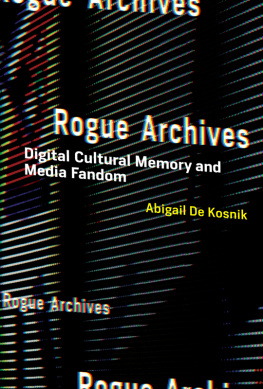
Academic Archives
Managing the Next Generation of College and University Archives, Records, and Special Collections
Aaron D. Purcell
Neal-Schuman
Chicago
The Archivists and Records Managers Bookshelf
No. 1 Archives and Archivists in the Information Age, by Richard J. Cox
No. 2 Understanding Data and Information Systems for Recordkeeping, by Philip C. Bantin
No. 3 Leading and Managing Archives and Records Programs: Strategies for Success, edited by Bruce W. Dearstyne
No. 4 Academic Archives: Managing the Next Generation of College and University Archives, Records, and Special Collections, by Aaron D. Purcell
Published by Neal-Schuman, an imprint of ALA Publishing
50 E. Huron Street
Chicago, IL 60611
www.neal-schuman.com
2012 by the American Library Association
All rights reserved. Reproduction of this book, in whole or in part, without written permission of the publisher, is prohibited.
Cover photo by Steve Tatum.
Library of Congress Cataloging-in-Publication Data
Available at http://catalog.loc.gov
ISBNs: 978-1-55570-769-9 (paper); 978-1-55570-812-2 (ePUB); 978-1-55570-813-9 (Kindle). For more information on digital formats, visit the ALA Store at alastore.ala.org and select eEditions.
For
Laura Marie Stevralia Purcell,
editor-in-chief, writer of the family,
and instigator of my happiness
Contents
So what are academic archives? In the past, this term referred to college and university archives programs, which collected, preserved, and provided access to material that documented their institutions history. Today, however, the field of academic archives is more expansive and complex. In addition to college and university archives, academic archives encompass records management programs, special collections departments, and other campus archival repositories. This new definition of academic archives programs has also redefined the role, and training, of academic archivists.
Todays academic archivists differ from their predecessors. Most of todays archivists working in higher education have access to education, training, and technology that were not available to previous generations. Demand for services and information by diverse user groups has also changed the mission of many academic archives. Academic institutions are the home to many archivists, and for good reason; nowhere is there such a need for talented people to contribute to an understanding of the past and help inform the future.
The majority of todays academic archivists work in programs with direct connections to a campus library system. Academic archives have taken many cues from academic libraries on redesigning reference services, creating collaborative spaces, reaching users with new technology, and merging units into larger departments. Likewise, academic librarians have learned from academic archivists the importance of building unique research collections, primary source education and instruction, and contributing to scholarly communication, both in print and electronic formats. This influence is most evident in the dramatic changes in special collections departments, the most common location for archives programs within academic libraries.
Academic Archives: Managing the Next Generation of College and University Archives, Records, and Special Collections examines the changing world of academic archives. It defines todays academic archivists and the future of their work. Academic archivists, who may be special collections librarians, records managers, reference archivists, manuscripts processors, college or university archivists, and curators, are integral to the ever-changing academic library. In the face of limited resources and campus downsizing, academic archivists must wear many professional hats, assume multiple roles and titles, and develop new skills to meet the research and technological needs of their researchers. No longer can academic archives programs remain isolated, committed to narrow missions, limited to tiny constituencies, and without a true vision. To accomplish this transformation, academic archivists must keep their programs relevant, growing, and connected to other parts of their campus environment, especially the academic library.
Academic Archives is designed to appeal to archivists of all ranks and experience, archivists working outside of academic libraries, archivists in training, other information professionals, library directors, historians (who often describe themselves as archivists because of their research skills), and members of the academic community. Readers wanting to start an archives program (academic and non-academic), update an existing archives program, begin a career in academic archives, or remain current on recent developments, will find this timely reference source valuable.
At its heart, Academic Archives examines big-picture, practical issues of working as an academic archivist and managing the next generation of academic archives programs. It is not focused on just college or university archives but conceptualizes academic archives more broadly, with a particular focus on merged departments in academic libraries, such as a special collections unit. The major themes include choosing a career in academic archives, working with other information professionals in an academic library, defining and articulating the vision, connecting the program with the goals of the institution, integrating records management functions into the archival program, building collections with help from donors and dealers, presenting unique material to many audiences, determining the best approaches to processing and organizing collections, digital opportunities, explaining the role of archivists in twenty-first-century academic libraries, and defining what it means to be an academic archivist.
ORGANIZATION
Academic Archives is divided into three parts. The first section, consisting of three overview chapters, defines the academic archives environment. archivists. It describes career paths to academic archives, some of the most common traits evident in todays academic archivists, and how academic archivists remain current in such a dynamic environment.
focuses on special collections, a significant counterpart to academic archives, which often serves as the home department for an archives program. It describes how these often misunderstood departments fit into the academic library, the kinds of collections found in these units, the training and preparation for special collections librarians, recent initiatives in this subfield, and finally how academic archivists fit into the special collections model. This first section emphasizes that by knowing the landscape, trends, and expectations of academic libraries and higher education, archivists have ample opportunities to make themselves and their programs an indispensable part of the academic environment.
The second section is more prescriptive and explains how to build and update an archives program in an academic library. Academic archivists must be resourceful and generate support for their collecting efforts on campus, while often seeking collections with little or no funding. These chapters examine the internal operations of academic archives, processes that have significant implications for the development of public and research services.
examines practical approaches to maintaining a mission and charting a vision for academic archives. Successful academic archivists must exhibit broad leadership, manage and share resources, keep current in several fields, identify stakeholders, and target users for their collections and services.
Next page
